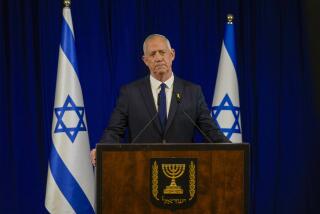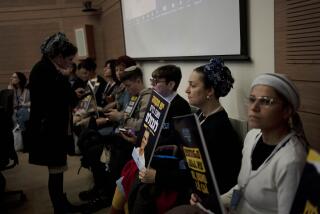Rafael Eitan, 75; Former Israeli Army General and Hard-Line Political Leader
- Share via
JERUSALEM — Rafael Eitan, a blunt former Israeli army chief and Cabinet minister who opposed any compromise with the Palestinians, drowned Tuesday after being swept into the stormy Mediterranean Sea while inspecting equipment at a construction site. He was 75.
Eitan was working for a construction company expanding the southern Israeli port of Ashdod when he was swept off a breakwater, port officials said. Eitan was on the breakwater to check whether equipment had been damaged in a storm.
“The state of Israel lost today a courageous fighter, commander and leader,” Prime Minister Ariel Sharon said in a statement.
“The man was courageous, a true leader, and embodied the true qualities of a fighter,” former President Ezer Weizman, who as defense minister appointed Eitan to head the Israeli Defense Forces, told the Jerusalem Post.
Eitan began his 37-year army service in the pre-state Palmach militia at the age of 16, serving in most of the country’s wars until he became army chief in 1978.
A graduate of the National War College, he served as a paratrooper officer in the 1956 Sinai Peninsula campaign. In 1967, he was wounded four times in combat when leading a paratroop battalion into the Sinai during the Six-Day War. Soldiers who served under him described him as fearless.
Eitan scorned the luxury and high living for which some senior officers developed a taste, particularly in the flush of victory after the 1967 war. Even as a general, a folding camp bed was more than enough for Eitan.
When troops returned from night raids against the Palestine Liberation Organization in Lebanon, he was always there to meet them.
He was a strict disciplinarian. He was also blunt on his views on relations with the Arabs. Once he referred to Palestinians as “drugged cockroaches in a bottle.”
Eitan’s retirement from the army in 1983 was overshadowed by an investigation into the massacre of Palestinian refugees in two camps near Beirut by an Israeli-allied Christian militia during Israel’s 1982 invasion of Lebanon. The Kahan Commission found that Eitan should have anticipated the danger and opposed the decision to send the Christians into the camp.
He formed the hard-line Tzomet party and was known for his opposition to transferring land to the Palestinians in peace deals. He served as agriculture and environment minister in the 1990s and as deputy prime minister.
Eitan left politics to work in his olive grove and build rocking horses at a wood shop in his birthplace of Tel Adashim, a cooperative farm in northern Israel. In an interview in 2001, Eitan said, “Nothing is missing in my life.”
In recent years, he obtained a fishing license and oversaw the port expansion project. He was on the job at the Ashdod port, working alongside laborers every day, port officials said.
In 1997, Eitan surprised many Israelis when he announced that his mother was a descendant of the Russian czar’s bodyguards, raising the possibility he was not Jewish.
He is survived by his second wife, Ofra; three daughters; and 10 grandchildren.
Eitan’s will be buried in a military ceremony today . at Tel Adashim.
More to Read
Sign up for Essential California
The most important California stories and recommendations in your inbox every morning.
You may occasionally receive promotional content from the Los Angeles Times.













